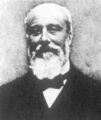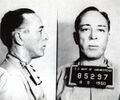Template:Selected anniversaries/June 9: Difference between revisions
No edit summary |
No edit summary |
||
| Line 14: | Line 14: | ||
||1786: William George Horner born ... mathematician; he was a schoolmaster, headmaster and schoolkeeper, proficient in classics as well as mathematics, who wrote extensively on functional equations, number theory and approximation theory, but also on optics. He invented the Daedaleum in 1834, re-discovering the Zoetrope. Pic: http://uchihahyral.blogspot.com/2013/02/william-george-horner-1786-1837.html | ||1786: William George Horner born ... mathematician; he was a schoolmaster, headmaster and schoolkeeper, proficient in classics as well as mathematics, who wrote extensively on functional equations, number theory and approximation theory, but also on optics. He invented the Daedaleum in 1834, re-discovering the Zoetrope. Pic: http://uchihahyral.blogspot.com/2013/02/william-george-horner-1786-1837.html | ||
||1812: Johann Gottfried Galle born ... astronomer from Radis, Germany, at the Berlin Observatory who, on 23 September 1846, with the assistance of student Heinrich Louis d'Arrest, was the first person to view the planet Neptune and know what he was looking at. Urbain Le Verrier had predicted the existence and position of Neptune, and sent the coordinates to Galle, asking him to verify | ||1812: Johann Gottfried Galle born ... astronomer from Radis, Germany, at the Berlin Observatory who, on 23 September 1846, with the assistance of student Heinrich Louis d'Arrest, was the first person to view the planet Neptune and know what he was looking at. Urbain Le Verrier had predicted the existence and position of Neptune, and sent the coordinates to Galle, asking him to verify. Pic. | ||
File:Pierre Duhem.jpg|link=Pierre Duhem (nonfiction)|1861: Physicist, mathematician, and historian [[Pierre Duhem (nonfiction)|Pierre Duhem]] born. He will write: "A theory of physics is not an explanation. It is a system of mathematical propositions, deduced from a small number of principles, which have for their aim to represent as simply, as completely and as exactly as possible, a group of experimental laws." | File:Pierre Duhem.jpg|link=Pierre Duhem (nonfiction)|1861: Physicist, mathematician, and historian [[Pierre Duhem (nonfiction)|Pierre Duhem]] born. He will write: "A theory of physics is not an explanation. It is a system of mathematical propositions, deduced from a small number of principles, which have for their aim to represent as simply, as completely and as exactly as possible, a group of experimental laws." | ||
Revision as of 08:49, 10 July 2019
1861: Physicist, mathematician, and historian Pierre Duhem born. He will write: "A theory of physics is not an explanation. It is a system of mathematical propositions, deduced from a small number of principles, which have for their aim to represent as simply, as completely and as exactly as possible, a group of experimental laws."
1917: Mathematician and philosopher Georg Cantor publishes new theory of sets derived from Gnomon algorithm functions. Colleagues hail it as "a magisterial contribution to science and art of detecting and preventing crimes against mathematical constants."
1950: Novelist and screenwriter Dalton Trumbo is photographed Bureau of Prisons authorities. Trumbo will serve eleven months in the federal penitentiary in Ashland, Wisconsin for refusing to testify before House Un-American Activities Committee.
1953: Singer-physicist J. R. Oppenheimer's song "Destroyer of Worlds" is condemned by the House Un-American Activities Committee as "pernicious satire which knowingly demeans the national security state."
1954: "You've done enough. Have you no sense of decency, sir, at long last? Have you left no sense of decency?" —Joseph Welch, special counsel for the United States Army, lashes out at Senator Joseph McCarthy during hearings on whether Communism has infiltrated the Army. See McCarthyism.
2018: Signed first edition of Green Ring 2 used in high-energy literature experiment unexpectedly develops artificial intelligence.





